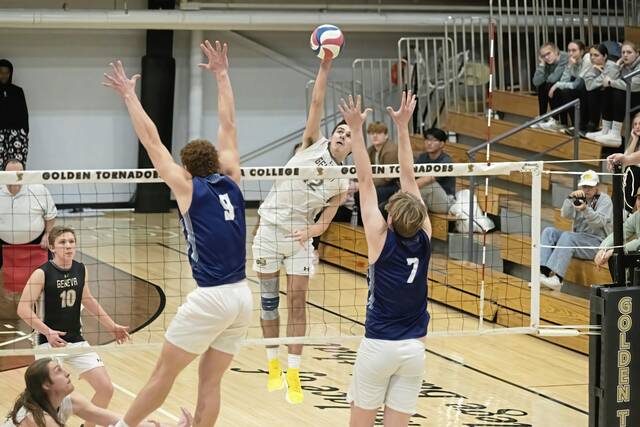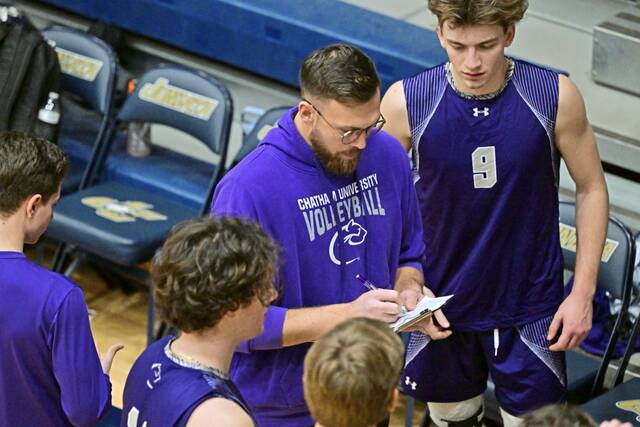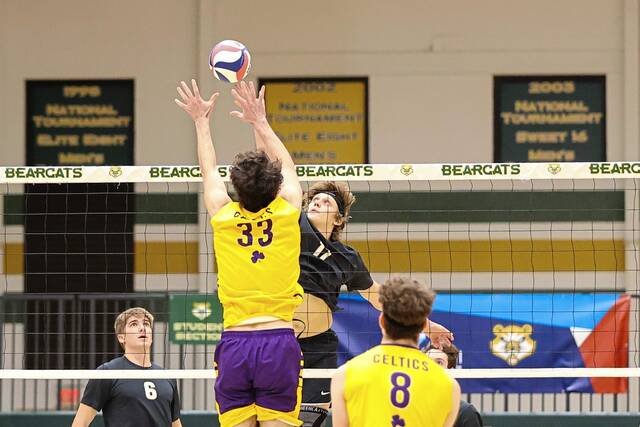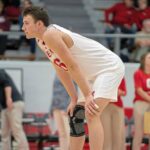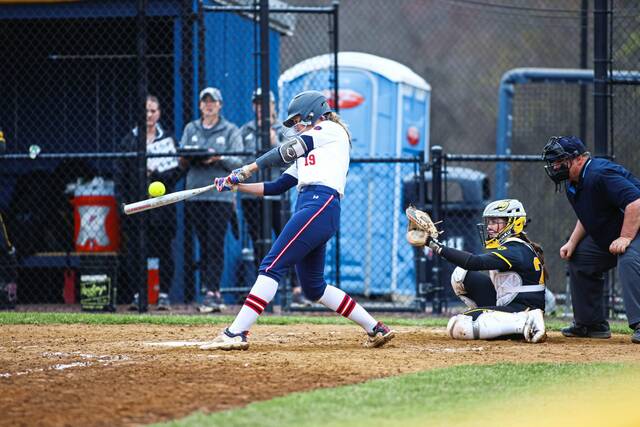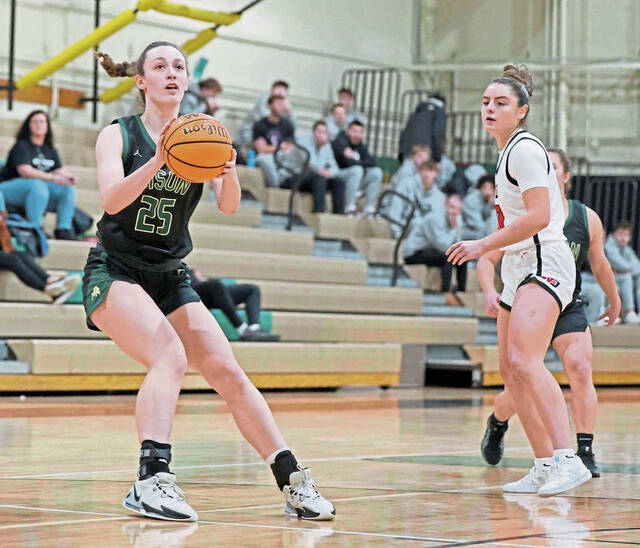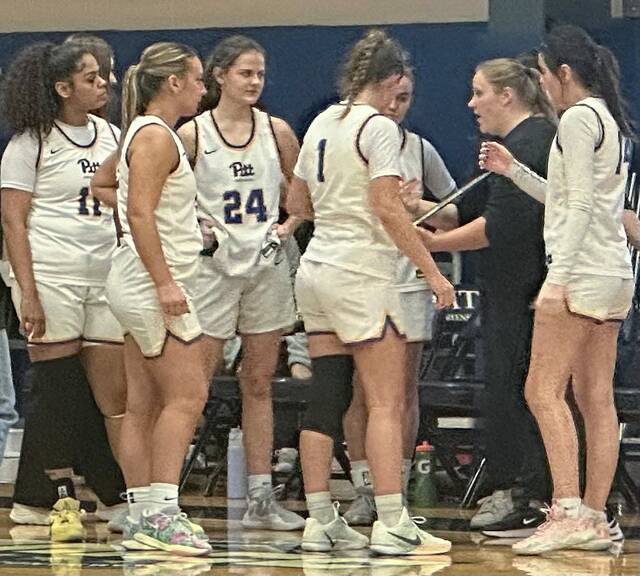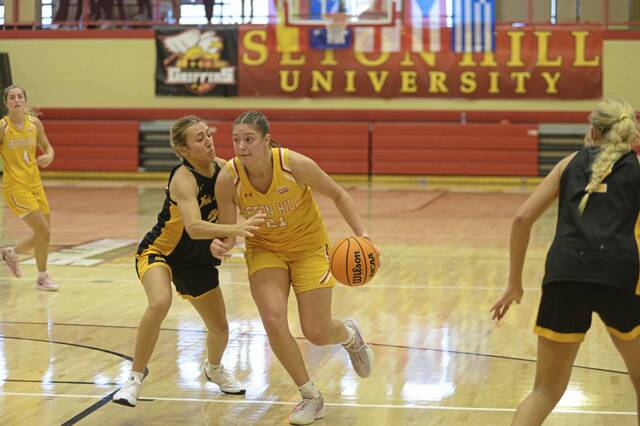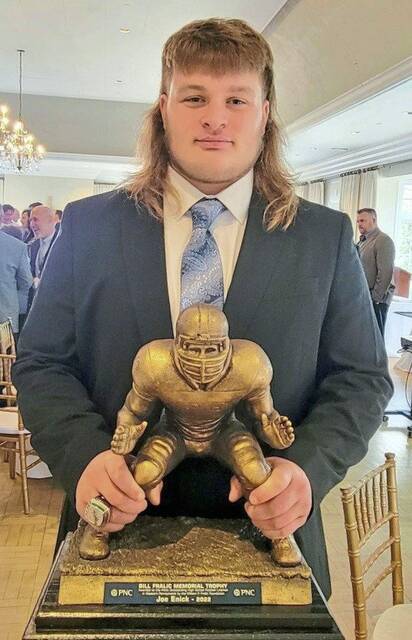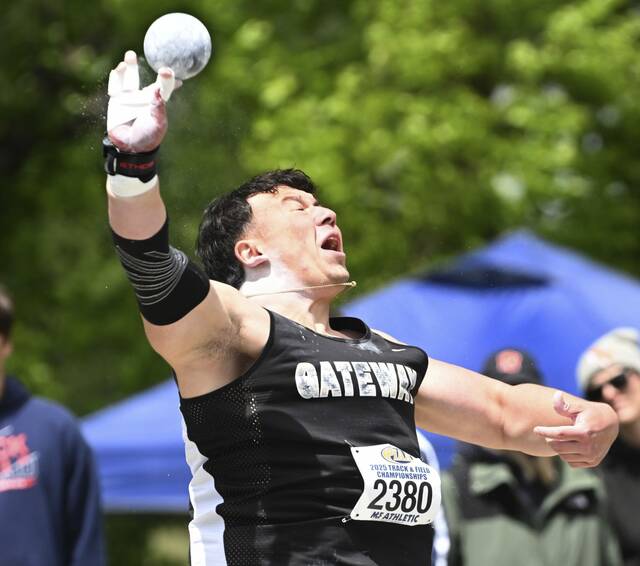Brett Heckathorn has had a lifelong love for volleyball. A player at Butler, he went on to be a captain of Grove City College’s men’s club team.
But coaching a men’s volleyball team wasn’t on Heckathorn’s radar. He had served as an assistant for the Grove City women’s team and seemed to be content in that role.
Then, in December 2022, the college announced it would be adding men’s volleyball as an intercollegiate sport for the 2025 season. Heckathorn jumped at the chance to interview for the coaching position, and, three months later, he was named the first coach in program history.
“I think it was kind of one of the last dominoes to fall,” Heckathorn said. “I don’t think Grove City would have went varsity unless the PAC added it. … When the PAC started those rumblings that they were going to sponsor men’s volleyball, Grove City’s response was, well, if you need a sixth (team), we’ll be the sixth to get the AQ (automatic NCAA Tournament qualifying status) and make sure the conference gets off and running pretty quickly.”
Heckathorn and the Wolverines are riding a wave of boys and men’s volleyball. As boys volleyball continues to grow nationwide, more colleges, in turn, are adding the sport, and 2025 marks the first season for the Presidents’ Athletic Conference to sponsor men’s volleyball. (Another Division III conference, the Old Dominion Athletic Conference in Virginia, also added men’s volleyball this season.)
Geneva swept Bethany, 25-11, 25-20, 25-13, in the first official PAC men’s volleyball match Feb. 6.
The PAC comprises seven teams: Bethany, Chatham, Geneva, Grove City, Hiram, Thiel and Saint Vincent.
Thiel and Hiram have the most established programs, Thiel in its 15th season of intercollegiate competition and Hiram in its ninth. Geneva and Saint Vincent have been around for seven and six years, respectively. Bethany and Chatham played independent schedules last season, and Grove City rose from the club ranks this season.
Before the PAC sponsored men’s volleyball, Thiel, Hiram, Saint Vincent and Geneva played in the Allegheny Mountain Collegiate Conference. The coaches of those programs are excited to be “home” in the PAC.
“I think it’s growing, and the amount of interest in high schools is growing and the amount of club programs is growing,” fourth-year Saint Vincent coach Kate McCauley said. “It’s an awesome thing that we (the PAC) have started it, and now it’s closer to home for a lot of kids, especially here in Western Pennsylvania.”
Added first-year Geneva coach Alexis Ritson: “It definitely makes sense. … It’s easier to explain to recruits that we’re in the same conference as everyone else. There’s not this long spiel that we’re in the AMCC and we play some of the same schools (as in the PAC) but we’re traveling farther because we (the PAC) don’t have men’s volleyball.”
Grove City is the relative unknown in terms of how it will fare in intercollegiate competition. Chatham and Bethany got a taste of it last year during their independent schedules, and each faced the other four PAC schools.
Heckathorn at least had the advantage of the club team from which to build, but not all of the club players made the transition to varsity. Heckathorn estimated his roster is roughly 50/50 between club players and recruits.
“There definitely is a considerable jump to Division III athletics where teams are more solidified. They’re committed a little bit more,” Heckathorn said. “There’s little things that pop up here and there like, ‘Oh. I have to lift?’ It’s not an optional thing.
“We had a little bit of ‘melt’ coming into this year already where guys are just kind of stepping away like, it was fun and I enjoyed my club experience, but I’m going to focus my time elsewhere.”
Bethany and Chatham, meanwhile, had to start from scratch. Joe Bortak, who coaches the Chatham women, also was installed as the men’s coach when the school revealed its plans to add the team.
The Chatham women’s 2022 season ended in November, and Bortak had six months to get the men’s team off the ground. Practices would get underway in fall 2023 with competition beginning in spring 2024.
The Cougars took their lumps last season, going 6-14. Bethany lost all 26 of its matches.
While he expects both programs to be improved, Bortak acknowledged that the more established teams are, at this point, a step ahead of the newer programs, particularly when it comes to depth.
“With it being a four-month season … we’re going to get hit with the injury bug sooner or later,” said Bortak, whose Cougars open PAC play Feb. 19 by hosting Hiram. “The academics certainly are going to take a toll on the kids. If you have somebody you can sub in from time to time … yeah, some more experienced schools will have a little more depth.”
But even fledgling programs such as Chatham and Bethany will have one big advantage over Grove City:
“Come mid-February and early March, when we’re playing all these conference games, those guys (established programs) have been through a varsity season before, and we haven’t,” he said. “There’s going to be a midseason curve or trying to get over a hump somewhere. … It’s a longer season than any of these guys have played before.”
Competition in the PAC promises to be fierce. Saint Vincent, Hiram, Thiel and Geneva were the top four teams in the AMCC last season, with Hiram defeating Saint Vincent for the title.
McCauley said she saw Grove City play during a tournament at Juniata earlier this season and was impressed by the Wolverines’ chemistry and camaraderie. Chatham and Bethany also have made strides, with the Bison earning the program’s first victory: a sweep of Carlow on Jan. 23. Carlow had swept Bethany last season.
The coaches are expecting parity in the PAC.
“I’ve seen … complete growth and change in a lot of these programs,” McCauley said. “I think the competition is not going to miss a beat. … I feel the competition is going to be even greater than it was in the AMCC.”
Added Ritson: “In the AMCC, the spread was much bigger between the top teams and the bottom teams. But for the PAC, there’s a lot more parity for sure. … I think it’s anybody’s game. I don’t think there’s anyone that’s far and away much better or far and away much worse than anybody else.”
Of course, not only will Ritson, McCauley and their counterparts be competing for the same trophy. They will be competing for the same players.
That competition, though, could turn out to be a benefit. The coaches are optimistic that a symbiotic relationship can develop: more men’s volleyball options closer to home will lead to a greater interest in the sport at the high school and club levels, which, in turn, will produce a wider talent pool from which to draw.
“It was long overdue,” Bortak said. “If the WPIAL kids — even (other) Western Pennsylvania kids — wanted to go play somewhere, they were driving three, four, five hours to find the opportunity. So it’s nice to give these kids a nice place to play in our backyard.”
Heckathorn, meanwhile, is relishing the chance to do something he never thought possible.
“It’s really fun to be a part of the growth of the sport,” he said.


